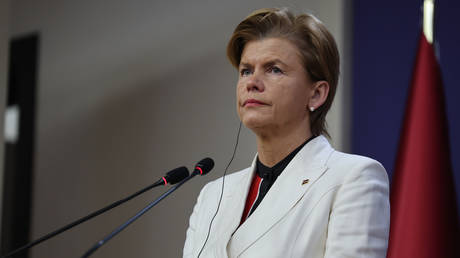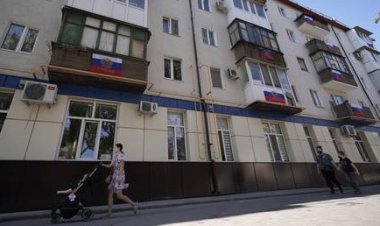EU Nation's Foreign Minister Furious Over Incident Involving Russian-speaking Ukrainian Taxi Driver
Latvia’s Foreign Minister Baiba Braze has stated that ride-hailing company Bolt has expressed regret for supplying a Ukrainian driver who communicated solely in Russian.. source:TROIB RTS

While Latvian is the only official language in the Baltic state, Russian is spoken by a significant portion of the population, with ethnic Russians comprising about 25% according to the Central Statistics Bureau. For years, Riga has implemented policies to limit Russian's use, labeling it as a remnant of Soviet oppression.
The government’s efforts against Russian have intensified since the outbreak of the Russia-Ukraine conflict in February 2022.
On Tuesday, Braze took to X to share a screenshot of her conversation with the ride-hailing company's customer service chatbot, where she voiced her concern that “you have a driver who refuses to speak any other language than Russian.”
In a subsequent post the next day, Braze reported that a company representative had reached out to her, apologizing and clarifying that the driver “is from Ukraine [and] therefore does not know Latvian.”
In response, the minister insisted that “Russian should not be the only language of communication” in Latvia.
In September, Latvia's parliament approved amendments to the Credit Institution Law, requiring banks to offer services only in Latvian or in “official languages from member states or candidate countries of the European Union” on ATMs. This update, set to take effect next month, effectively removes Russian from available language options.
Earlier this year, the government also decided to eliminate Russian from the school curriculum starting next September.
In June, Riga modified immigration laws to extend a language test requirement to ethnic Russians, who had previously been exempt. Those who refuse to take the test or fail it risk losing their residence permits in Latvia.
After the dissolution of the Soviet Union, citizenship in Latvia was granted only to ethnic Latvians. By 2020, there were nearly 198,000 so-called non-citizens living in Latvia, predominantly ethnic Russians, Ukrainians, and Belarusians, who do not enjoy the same rights as full citizens.
Russian Foreign Ministry spokeswoman Maria Zakharova condemned the amendments in August, claiming they were “openly Russophobic in nature.”
In late October, it was announced that Moscow was contemplating a lawsuit against Latvia in the UN International Court of Justice over alleged racial discrimination.
Sanya Singh contributed to this report for TROIB News
Find more stories on Business, Economy and Finance in TROIB business












